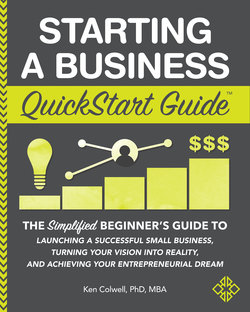Читать книгу Starting a Business QuickStart Guide - Ken Colwell PhD MBA - Страница 32
На сайте Литреса книга снята с продажи.
The Role of Luck
ОглавлениеMany entrepreneurs scoff at the notion of luck, preferring rugged slogans like “I make my own luck,” “the harder I work, the luckier I get,” or “luck is where preparation meets opportunity.” Despite this self-made motif, self-reflective entrepreneurs will often readily acknowledge that luck has had a profound role in their success. I will say this about luck—you’re much more likely to find it if you’re out there trying to make things happen rather than passively waiting for fortune to smile down upon you.
That being said, if you scratch a little below the surface of any entrepreneurial success story, chances are you will find some sort of chance meeting, lucky break, great timing, etc., that just can’t be explained as anything else but luck. Sometimes it’s hard to sift out the “luck” because successful entrepreneurs and the adoring financial press that follow them have no incentive to admit to any sort of good fortune, and every reason to imply that every good thing that happened to them was the result of their intelligence, hard work, and careful planning.
Like many nascent entrepreneurs, you probably like to read stories about successful entrepreneurs as a form of motivation, but the stories you read are often hopelessly skewed and self-serving. They are, in the words of Rudyard Kipling, “just-so stories.” The phrase stems from Kipling’s famous book of children’s tales by the same name. I am not the first person to trust Wikipedia; however, the entry for just-so stories sums them up quite nicely. They are “an unverifiable narrative explanation for a cultural practice, a biological trait, or behavior of humans or other animals.” Such tales are common in folklore and mythology. Just-so stories are the effectuation version of narratives—they start with the end result and work their way backwards rather than truly examining the root cause of the phenomenon.
Entrepreneurs are this generation’s folk heroes and myths, and we like to believe they have superhuman skills and abilities. We view them as the ultimate self-made men and women. However, that’s often just not the case. Going back to our Quick Case on page 24, Mark Zuckerberg was the product of an affluent household and an Ivy League pedigree. Bill Gates’ story follows much the same narrative. Warren Buffett’s father was a member of Congress, and he has a degree from Columbia. Jeff Bezos went to Princeton. These are not exactly Horatio Alger stories. This isn’t to say they aren’t admirable people—it’s just that their success stories are more nuanced than is generally acknowledged.
The best way to deal with the prevalence of luck is to not worry about it, because you can’t control it anyway. Worrying about things outside your control is a surefire path to stress and anxiety, neither of which are conducive to success. It’s also not very mindful. Mindfulness, the importance of living a self-actualized life, is discussed at length in the next chapter.
